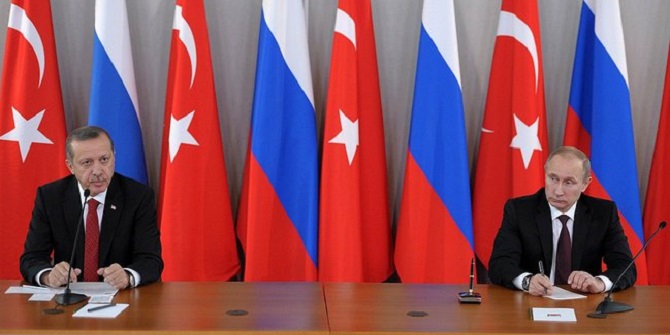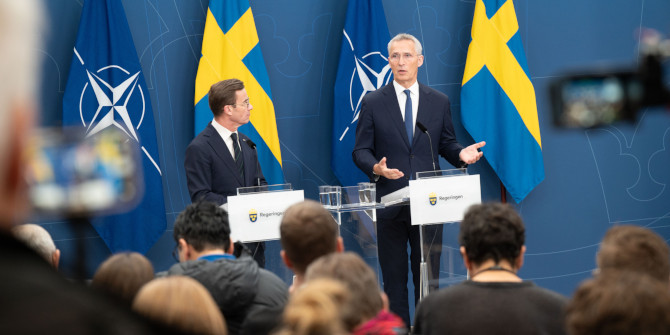 The EU has recently completed trade agreements with a number of different countries in Latin America, and is seeking further agreements in Asia. Maria Garcia looks at the EU’s recent history of trade negotiations, arguing that free trade agreements offer an important opportunity to ‘level the playing field’ for EU businesses facing competition from the United States, China, and beyond.
The EU has recently completed trade agreements with a number of different countries in Latin America, and is seeking further agreements in Asia. Maria Garcia looks at the EU’s recent history of trade negotiations, arguing that free trade agreements offer an important opportunity to ‘level the playing field’ for EU businesses facing competition from the United States, China, and beyond.
At the end of June, following negotiations in 2010, the European Union signed comprehensive trade agreements with Peru and Colombia, and the Central American states of Costa Rica, Guatemala, El Salvador, Honduras, Nicaragua and Panama. These broad and ambitious agreements solidify some of the EU’s key trade objectives since EU Trade Commissioner Mandelson launched the ‘Global Europe’ strategy in 2006. Key aims include the incorporation of the ‘Singapore issues’ which were blocked at the World Trade Organization (WTO) by the developing world; namely, competition policy, access to public procurement contracts, liberalisation of the service sector and stringent intellectual property rights protection, in the case of the EU also incorporating its geographic indicator system for the protection of wines and agricultural products.

It is expected that the agreements will boost exports and foreign direct investment opportunities. They enhance transparency in competition rules and public procurement processes and will create dispute-settlement mechanisms between the parties. They also commit the parties to adopt core International Labour Organisation standards as well as eight international environmental conventions. In this way the EU creates market opportunities for its businesses, and also ensures the application of standards more similar to those of the EU, thus enhancing its external governance, and potentially granting its businesses advantages, or at least leveling the playing field for them. Indeed, some developing economies have argued that Europe’s insistence on labour and environmental standards are veiled forms of protectionism, and it is these issues that are prolonging negotiations with an otherwise very open economy as Singapore’s. However, the inclusion of these elements in the agreements, as well as cooperation in sustainable development, and, in the case of the agreement with Central America, also on regional integration cooperation, reveal normative foreign policy goals, which whilst possibly granting economic advantages, are wedded to the aspects of EU foreign policy which some have dubbed ‘normative power’.
What is particularly striking about the recent agreements is that these states represent less than 1 percent of EU total trade, and were absent from the list of priority partners set out in ‘Global Europe’, which highlighted market potential, obstacles to EU trade and investment, and negotiations with competitors as the economic reasons behind free trade agreements. That list included members of the South American trade agreement Mercosur, with which a deal remains elusive given differences over agricultural market access, and crucially South Korea and the Association of Southeast Asian Nations (ASEAN). With South Korea immersed in free trade negotiations with the United States, the EU, in a move reminiscent of the swift negotiations with Mexico in the late 1990s in the aftermath of the creation of the North American Free Trade Agreement (NAFTA), quickly mobilised to negotiate with South Korea, and in fact concluded and implemented its free trade agreement months ahead of the US. Bloc-to-bloc negotiations with ASEAN faltered, given ASEAN diversity, the then controversial issue of Myanmar, and the EU’s insistence on political issues as well as economic ones. Consequently, in 2010 the Commissioner for Trade Karel de Gucht launched bilateral negotiations with Singapore, Malaysia and Vietnam (the first two have free trade agreements with the US, and all with China), stressing that the EU was only available for ‘deep’ trade agreements, i.e. agreements incorporating the Singapore issues like the ones just signed with Latin American states. In 2007 negotiations also began with India. These have been protracted and controversial, especially regarding investor protection and the issue of intellectual property rights and generic medicines. Despite several deadlines, EU representatives hope to complete negotiations this year.
Whilst the recently signed deals with Latin American states may lack the economic significance of potential deals with emerging Asian economies, they reveal a concern with maintaining competitiveness internationally, and keeping abreast of free trade developments. Peru and Colombia both have free trade agreements with the United Sates, and the Central American states were some of the first to negotiate agreements with the US, once the American government decided to pursue a competitive multi-pronged approach to extending its liberalisation agenda in the early 2000s. It did this by abandoning strict multilateralism and engaging in free trade agreements with other partners, creating competition amongst third parties, fearful of potential trade diversion, to liberalise to the desired degrees that agreements with the US enshrine. In a similar vein, once it became clear in 2003 that the WTO Doha Round was unlikely to prosper, and seeing how the US was extending its network of WTO-plus free trade agreements, the EU finally accepted Latin American overtures for free trade negotiations in 2007, although Latin American states as part of their free trade agreement and diversification strategies had been requesting negotiations with the EU since the early 2000s.
These agreements, together with the agreement with South Korea, show the importance of using free trade agreements to ‘level the playing field’ for EU businesses within the context of key competitors’ agreements (especially those of the US as for now they are ‘deeper’ in content than those of China and others), as well as to secure the inclusion of Singapore issues and specific EU regulatory preferences. The latter are particularly important in terms of shaping future economic governance, as the WTO remains stalled, and reveal the true extent of competition with other economic powers. In the midst of the financial and economic crises, which are tarnishing the EU’s reputation, and its ability to leverage its market in its relations with third parties, the signing of agreements which set precedents for the acceptance of EU regulatory preferences takes on an added significance. The real test, for the EU, will be whether it can continue this trend in ongoing negotiations in the Asian continent.
Please read our comments policy before commenting.
Note: This article gives the views of the author, and not the position of USApp– American Politics and Policy, nor of the London School of Economics.
Shortened URL for this post: http://bit.ly/13Md5Ab
_________________________________________
 Maria Garcia – National Centre for Research on Europe, University of Canterbury, New Zealand
Maria Garcia – National Centre for Research on Europe, University of Canterbury, New Zealand
Maria is currently a Marie Curie post-doctoral fellow at the National Centre for Research on Europe, researching free trade agreements in the Asia Pacific region, with a focus on EU and Chinese strategies and the impact of perceived threats in developing these strategies. She was previously a Lecturer in European Politics at Birkbeck College, University of London, and the University of Nottingham.






